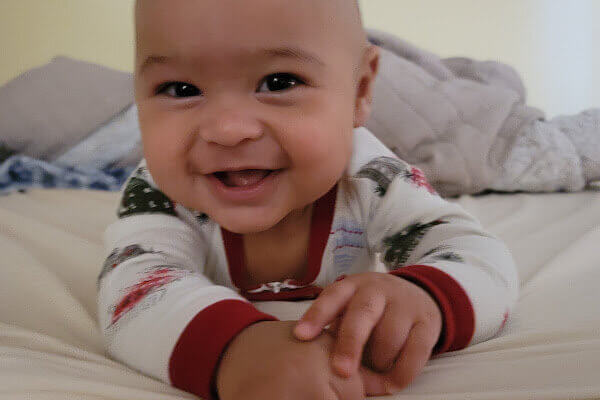By Nancy Gottesman
Which part of newborn care are new moms and dads most concerned about? “Everything!” says Tanya Remer Altmann, MD, a spokesperson for the American Academy of Pediatrics, a clinical instructor of pediatrics at the UCLA School of Medicine and the author of Mommy Calls: Dr. Tanya Answers Parents’ Top 101 Questions About Babies and Toddlers (AAP, 2008). “But if I had to choose [one], it would be sleep.”
In the first few weeks, your baby’s random sleep patterns (which work just fine for her) can leave you feeling bleary and bedraggled. But there’s a lot you can do now to promote sleep habits in your baby that will affect your slumber, too. We asked pediatric sleep experts to share their best tips for keeping your baby safe and sound—and you more refreshed and relaxed.
Baby’s unique sleep habits
Newborns sleep anywhere from 11 to 18 hours a day—and not in one long snooze. In the first few months of life, your baby will wake up every one to four hours to eat, which can be frustrating for dog-tired parents. “In the beginning, you really have no choice but to go with the baby’s schedule,” says Nadav Traeger, MD, director of Pediatric Sleep Medicine at Maria Fareri Children’s Hospital at Westchester Medical Center in New York. “As they grow, their waking hours will increase and sleep time gradually gets consolidated into one longer period at night.”
NEXT: HOW MUCH SLEEP YOUR BABY SHOULD BE GETTING
{pagebreak}
Here’s a very general guide to an infant’s daily sleep schedule in the first six months:
Newborns
Daytime: 8 to 9 hours
Nighttime: 8 to 9 hours
Total: 16 to 18 hours
Two-month-olds
Daytime: 6 to 7 hours
Nighttime: 8 hours
Total: 14 to 15 hours
Six-month-olds
Daytime: 4 hours
Nighttime: 9 to 10 hours
Total: 13 to 14 hours
Don’t worry if your baby sleeps more or less than these guidelines reflect. If an infant is growing and thriving, he’s getting the right amount of sleep. “Many first-time parents worry that their newborn sleeps ‘all the time,’” says Joseph Gigante, MD, an associate professor of pediatrics at Monroe Carell Jr. Children’s Hospital at the Vanderbilt University School of Medicine in Nashville. “As you can see by these numbers, they are correct, but this is normal behavior.”
Nap schedules also differ with every baby. One baby may sleep a lot at night and stay awake during the day, while another may do just the opposite. As they get older, the need for daytime slumber changes: A 6-month-old may take two naps totaling three to four hours, while a 12-month-old may only need one nap of two hours. “I don’t believe you can impose a sleep or nap schedule in the first few weeks,” says Michael Katz, MD, senior vice president at the March of Dimes Foundation and professor emeritus of pediatrics at Columbia University in New York City. “A schedule will develop as you watch for your baby’s cues.”
Nap and nighttime sleep cues include signs of fatigue such as decreased activity, eye rubbing, looking tired, yawning or fussing. When you notice any of these, put your baby in his crib or bassinet. At first, you may be too sleepy yourself to fully notice your baby’s snooze signals. By the six-week mark, however, you will recognize your baby’s prompts and a sleep-wake pattern will fall into place. By then, you’ll be more rested and feel more confident—we promise!
NEXT: HOW TO ENCOURAGE YOUR BABY TO SLEEP
{pagebreak}
How to encourage your baby’s sleep
It’s every new parent’s eternal question: When will my baby sleep through the night? “The answer depends on how you define ‘sleep through the night,’” says Traeger. “Twelve hours may not happen for a year, but a six- to seven-hour stretch of nighttime sleep can happen when your baby is 6 months old.”
Although you’re going to be on your baby’s clock for the first few months, there are several things you can do to promote his sleep now:
Breastfeed.
You may have heard that formula-fed kids sleep better and longer, but our experts say there is very little difference in slumber time between breastfed and formula-fed babies. Plus, the health benefits of breastfeeding far outweigh any marginal sleep difference your friends or family may claim! (In addition, breastfed babies have a lower SIDS rate than formula-fed babies do. See “Safe Sleeping” on page TK.)
Start a bedtime routine as soon as possible.
When your baby is younger than 3 months old, he cannot yet tell the difference between night and day. Relaxing activities at the same time every night can help your infant discern between playtime and quiet time. “A good routine could be something like a bath, PJs, reading a book, feeding, swaddling, then placing the baby in the crib and turning out the lights,” says Altmann. “He may fall asleep during the feeding or you can rock him to sleep, which at this age is fine.”
When your baby is 3 to 4 months old, place him in the crib when he’s still awake.
Be consistent with your nightly routine, but end it while your baby is drowsy yet still awake enough to learn how to soothe himself to sleep. If feeding or rocking always puts him to sleep, reverse the order of your bedtime routine so you end with story time. If he gets used to always being rocked or fed to sleep, he will need you to do this every night and in the middle of the night every time he wakes up. “It’s very easy to feed or rock your baby to sleep,” says Fatima S. Khan, MD, FAAP, chair of pediatrics at Rush-Copley Medical Center in Aurora, Ill., and an assistant professor of pediatrics at Rush Medical College in Chicago. “But are you going to be able to sustain this for the next year…or two?”
At the 3 a.m. wake-up call, wait a few minutes before you jump in.
After four months of age, an infant’s cry could be just a wakeful part of his sleep cycle and he may go back to sleep on his own. “He’ll eventually sleep through these middle-of-the-night awakenings,” says Altmann. Unless you’re certain your baby is hungry or in distress, it’s okay to wait a few minutes to see what happens.
Cribs (or bassinets) are for sleeping.
Always put your baby to sleep in the same place at naptime and bedtime. “Make the crib the main place your baby sleeps—not the stroller, bed, car seat or playpen,” suggests Traeger. “If you have playtime elsewhere and make the crib a place just for sleeping, it sends a strong signal.”
Be consistent with your baby’s sleep environment.
When your infant wakes up for a feeding, turn on the lights just enough to give her your breast or bottle. If you keep the lights dim, it lets baby know it’s still nighttime. And keep the noise down as well. “Avoid sound machines and music at bedtime—they’re a crutch,” says Traeger. “Quiet is best.” In the morning, turn on the lights, open the shades and greet your baby with squeals of “good morning.” She’ll know it’s time to be alert and play.
Don’t skip a daytime nap hoping that your baby will sleep longer at night.
“This strategy often backfires,” says Traeger. Overly tired babies usually have more trouble going to sleep and staying asleep than those who are well-rested.
NEXT: HOW TO GET THE SLEEP YOU NEED
{pagebreak}
How to Get the Sleep You Need
Three essential tips for weary parents
1. When the baby sleeps, you sleep. Turn off the ringer on your cell phone and landline. Log out of your computer. Hide the laundry. Ignore the dirty dishes.
2. Forget hospitality. When friends and family come to see the baby, forgo hostess duty. Ask them to watch the baby while you take a siesta.
3. Share the night shift. Make a plan with your partner to split wee-hour feedings and diaper changes, even if you’re breastfeeding. (Pump and store bottles of breast milk so dad can feed baby, too.)
Writer Nancy Gottesman says that being the mother of a teenage son doesn’t lend itself to sound sleep, either.
Pediatric sleep experts to share their best tips.



